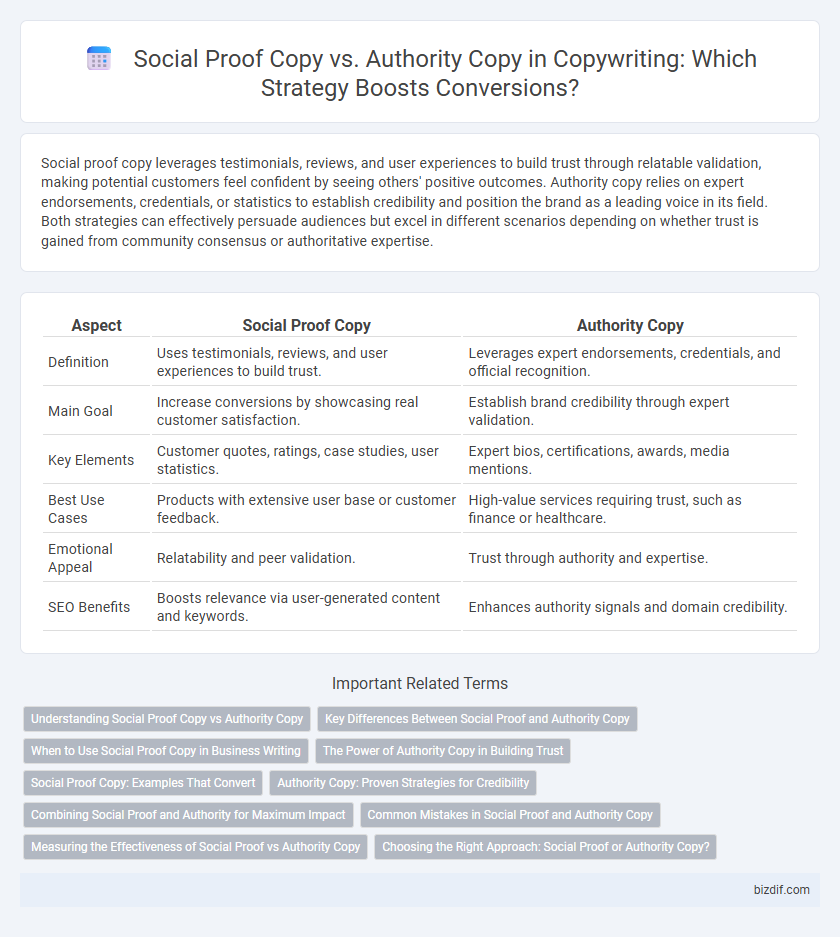Social proof copy leverages testimonials, reviews, and user experiences to build trust through relatable validation, making potential customers feel confident by seeing others' positive outcomes. Authority copy relies on expert endorsements, credentials, or statistics to establish credibility and position the brand as a leading voice in its field. Both strategies can effectively persuade audiences but excel in different scenarios depending on whether trust is gained from community consensus or authoritative expertise.
Table of Comparison
| Aspect | Social Proof Copy | Authority Copy |
|---|---|---|
| Definition | Uses testimonials, reviews, and user experiences to build trust. | Leverages expert endorsements, credentials, and official recognition. |
| Main Goal | Increase conversions by showcasing real customer satisfaction. | Establish brand credibility through expert validation. |
| Key Elements | Customer quotes, ratings, case studies, user statistics. | Expert bios, certifications, awards, media mentions. |
| Best Use Cases | Products with extensive user base or customer feedback. | High-value services requiring trust, such as finance or healthcare. |
| Emotional Appeal | Relatability and peer validation. | Trust through authority and expertise. |
| SEO Benefits | Boosts relevance via user-generated content and keywords. | Enhances authority signals and domain credibility. |
Understanding Social Proof Copy vs Authority Copy
Social proof copy leverages testimonials, reviews, and user experiences to build trust by showing potential customers that others have positively engaged with a product or service. Authority copy emphasizes expertise, credentials, and industry recognition to establish credibility and position the brand as a leading figure in the market. Understanding the differences helps marketers strategically craft messages that either appeal to social validation or authoritative influence, enhancing conversion rates.
Key Differences Between Social Proof and Authority Copy
Social proof copy leverages testimonials, reviews, and user-generated content to build trust through relatable experiences, emphasizing community validation and shared success. Authority copy relies on expert opinions, credentials, and official endorsements to establish credibility and persuade through recognized expertise and authoritative sources. The key difference lies in social proof highlighting peer influence, while authority copy underscores hierarchical trust and professional legitimacy.
When to Use Social Proof Copy in Business Writing
Social proof copy is most effective in business writing when the goal is to build trust and influence potential customers by showcasing testimonials, reviews, or user-generated content that highlights positive experiences. This type of copy resonates particularly well in e-commerce, service industries, and new product launches where buyer hesitation is common. Leveraging social proof copy helps reduce perceived risk and boosts conversion rates by validating the product or service through real customer endorsements.
The Power of Authority Copy in Building Trust
Authority copy leverages expert credentials, industry recognition, and credible endorsements to establish trust and credibility with the audience. Highlighting authoritative sources and proven expertise enhances perceived reliability and persuades consumers more effectively than social proof alone. This strategic emphasis on authority copy drives higher conversion rates by reinforcing brand legitimacy and expertise.
Social Proof Copy: Examples That Convert
Social Proof Copy leverages real customer testimonials, reviews, and user-generated content to build trust and drive conversions by showcasing relatable experiences and positive outcomes. Examples that convert often include specific metrics, such as star ratings or quantifiable success stories, which enhance credibility and influence buying decisions. Highlighting social proof elements like influencer endorsements or community engagement fosters a sense of validation and urgency, making the copy more persuasive.
Authority Copy: Proven Strategies for Credibility
Authority copy leverages expert endorsements, credentials, and industry awards to build trust and establish credibility with the audience. Incorporating verified data, professional titles, and authoritative sources enhances persuasive power, making the messaging more compelling and reliable. Using authoritative language and references boosts brand reputation and drives higher conversion rates by positioning the brand as a trusted leader in its field.
Combining Social Proof and Authority for Maximum Impact
Combining social proof and authority in copywriting amplifies credibility by showcasing real user experiences alongside expert endorsements, creating a powerful trust signal for potential customers. Leveraging testimonials, case studies, and influencer quotes alongside authoritative statistics or expert credentials enhances message persuasiveness and drives higher conversion rates. This strategic fusion taps into the psychological triggers of conformity and expertise, motivating audiences to take desired actions effectively.
Common Mistakes in Social Proof and Authority Copy
Common mistakes in social proof copy include overusing generic testimonials and failing to target specific audience pain points, which reduces credibility and engagement. In authority copy, errors often stem from relying too heavily on jargon or unverified claims, undermining trust and authenticity. Balancing relatable social proof with verified authority enhances persuasive copywriting success.
Measuring the Effectiveness of Social Proof vs Authority Copy
Measuring the effectiveness of social proof copy involves tracking metrics such as conversion rates, customer engagement, and testimonial-driven trust signals that demonstrate peer influence on buying decisions. Authority copy effectiveness can be evaluated by analyzing referral traffic from expert endorsements, brand credibility scores, and increased sales attributed to authoritative claims. A/B testing both copy types reveals how customer trust and perceived expertise impact overall campaign performance and ROI.
Choosing the Right Approach: Social Proof or Authority Copy?
Choosing the right copywriting approach hinges on your target audience and campaign goals; social proof copy leverages testimonials, reviews, and user-generated content to build trust through relatable experiences, enhancing conversion rates. Authority copy emphasizes expertise, credentials, and authoritative endorsements to establish credibility and position your brand as a leader in the industry. Analyzing buyer personas and the decision-making process can guide whether social proof's relatability or authority copy's expert validation better drives engagement and sales.
Social Proof Copy vs Authority Copy Infographic

 bizdif.com
bizdif.com